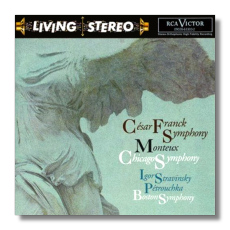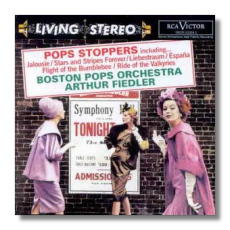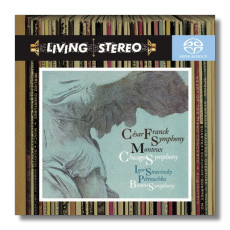
The Internet's Premier Classical Music Source
Related Links
-
Chabrier Reviews
Falla Reviews
Franck Reviews
Liszt Reviews
Mendelssohn Reviews
Rimsky-Korsakoff Reviews
Sibelius Reviews
Sousa Reviews
Stravinsky Reviews
Tchaikovsky Reviews
Wagner Reviews - Latest Reviews
- More Reviews
-
By Composer
-
Collections
DVD & Blu-ray
Books
Concert Reviews
Articles/Interviews
Software
Audio
Search Amazon
Recommended Links
Site News
 CD Review
CD Review
RCA Living Stereo

- César Franck: Symphony in D minor
- Igor Stravinsky: Pétrouchka *
Chicago Symphony Orchestra/Pierre Monteux
* Boston Symphony Orchestra/Pierre Monteux
RCA Victor Living Stereo 09026-63303-2 ADD 74:00
Also released on Hybrid Multichannel SACD
Amazon
- UK
- Germany
- Canada
- France
- Japan
- ArkivMusic
- CD Universe


Pops Stoppers
- Jacob Gade: Jalousie
- Albert William Ketèlbey: In a Persian Market
- Manuel de Falla: El amor brujo "Ritual Fire Dance"
- John Philip Sousa: Stars and Stripes Forever
- Emil Waldteufel: Les patineurs, Op. 183
- Franz Liszt: Liebesträume, S. 541 #3, O Lieb, so lang
- Emmanuel Chabrier: España
- Jean Sibelius: Karelia Suite, Op. 11 #3, Alla marcia
- Piotr Ilyitch Tchaikovsky: Eugene Onegin, Op. 24: Polonaise
- Nikolai Rimsky-Korsakoff: Flight of the bumblebee
- Felix Mendelssohn:
- Athalie, Op. 74: War March of the priests
- Midsummer Night's Dream, Scherzo
- Richard Wagner: Die Walküre: Ride of the Valkyries
Boston Pops Orchestra/Arthur Fiedler
RCA Victor Living Stereo 09026-63304-2 ADD 61:56
Monteux's Franck Symphony has seldom been out of the catalogue since its first release in 1962; this is its third U.S. release on CD alone. [The fourth release is the SACD version. -Ed.]
The conductor draws organ-like tones out of the Chicago Symphony Orchestra, and its star brass section shines, adapting well to the French idiom. This leisurely interpretation ensures the stature of a work that can be sanctimonious when left in less patient hands. The music's drama is unforced, and its singing qualities are emphasized. The winged Victory that adorns the cover is an apt metaphor for this symphony – and this playing – although it should be added that Monteux's smart conducting never could be called headless. Pétrouchka is a strange coupling for the Franck – the two works could hardly be more different. Monteux led the ballet's première in 1911, and his Boston recording from forty-eight years later remains an attractive alternative. Surprisingly, given his theatrical experience, Monteux seems less interested in presenting the music as a ballet score than as an extended tone poem, full of colorful effects and drama, and not as rhythmically pointed as it can be. In the absence of real dancers, he works hard to develop the ballet's main characters, and there are few recordings in which they have such strong musical personalities. There are too many good Pétrouchka s to say that Monteux's is the best (a more positive claim could be made about his Franck), but it never disappoints. I am curious, though, as to why Munch's Boston Symphony Orchestra sounds so much richer than Monteux's – did the two conductors use different seating arrangements?
Pops Stoppers is just the sort of music that earned Arthur Fiedler his reputation as the people's conductor. This (to quote the title of another of his albums) is music to have fun by. It is worth remarking, however, that few concert audiences actually get to hear some of these works anymore. Jacob Gade's Jalousie is probably the best tango ever written by a Scandinavian, but it is a rare visitor "live" and on disc these days. Similarly, Albert W. Ketèlbey's picture-postcard confections no longer have the drawing power they once did, and In a Persian Market has all but closed up shop – do you know anyone under the age of 60 who claims to adore the music of Ketèlbey?
Fiedler was not a conductor who imposed himself on the music, and in terms of interpretations, there is little about Pops Stoppers that is revelatory. Here as elsewhere, good taste and dependability are the watchwords. There is only one selection where this is just not enough. Victor Herbert's orchestration of Liszt's Liebestraum #3 blows a faded blossom up to Godzillan proportions, and the only way to make it work is to acknowledge its sins and celebrate them, in the manner of Stokowski. Stokie would have rolled around in this arrangement like a dog in filth, but Fiedler is more reticent. As a result, bad taste never gets the chance to have (and be) fun. To be fair, this is more Herbert's shortcoming than Fiedler's, and the program works well overall, Liszt-Herbert notwithstanding.
These Living Stereo reissues feature sound that would be excellent in any era. As with other releases in the series, original cover art and program notes have been used.
Copyright © 1999, Raymond Tuttle





















